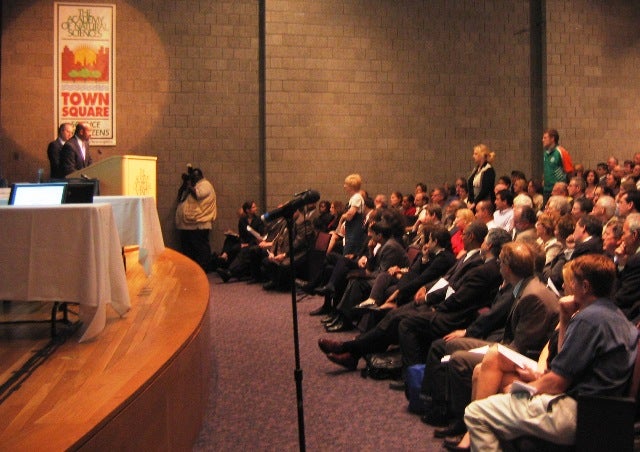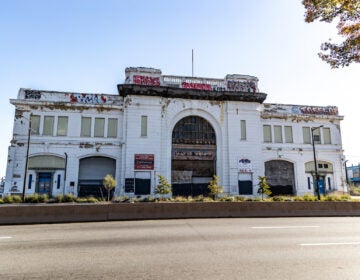Nutter empowers planning commission

Photos by Isaac Steinberg
June 17
In a major policy speech before an overflow crowd at the Academy of Natural Sciences, Philadelphia Mayor Michael Nutter restores the power of developing this 21st Century city to the Philadelphia City Planning Commission.
Watch his address.
By Thomas J. Walsh
For PlanPhilly
Before the speech, within the normally quiet, museum atmosphere of the Academy of Natural Sciences, a buzz steadily built up. It was that of a small concert hall, featuring Philly’s latest rock star, the mayor. Given the well-heeled crowd, though, maybe a chamber music concert is the better comparison.
But Mayor Michael Nutter, who decided on short notice to take the regular monthly meeting of the Philadelphia City Planning Commission into prime time Tuesday evening, didn’t disappoint the crowd of hundreds of adoring Philadelphians who packed the Academy’s auditorium and an overflow space with monitors in the lobby. After being introduced to a standing ovation – the norm for the mayor these days – his address was interrupted early and often with applause, cheers and laughter.
What was all the excitement about? City planning. Zoning codes. Transportation and infrastructure. Topics normally considered mundane by most citizens were turned into words and applause lines that gave the event the feel of a presidential victory speech in a swing state. So what if most of the people in attendance constituted “the choir” for planning issues, as one observer quipped? It was was just good to see the enthusiasm, he added.
It was no accident that one of the first things Nutter did after being sworn in was to appoint new leaders for the planning and zoning bodies, he said. “I did them on purpose and with foresight. … I took this quick action to make these appointments because, quite honestly, we don’t have a moment to lose.”
In fact, Nutter has been stressing the theme since even before he was elected last November, saying then that he’d “reestablish the Planning Commission as the nation’s preeminent city planning agency.”
He was at the Academy Tuesday night to officially reinforce that. “Over the years, for reasons of expediency, both political and economic, we’ve strayed from relying on the Planning Commission as the arbiter of planning expertise,” he said. “I want to return the commission to its rightful position.”
“I want to make it crystal clear that the Philadelphia City Planning Commission is the authority on planning and shaping this city. They are the authority.”
Nutter’s speech was also crafted to instill a healthy dose of competitiveness, indirectly mentioning Philly’s historic inferiority complex toward New York City and Washington, D.C. With the city’s change in fortunes during the 20th century, “some said that government’s task was to just manage, gracefully, the decline,” Nutter said. “We’re putting an end to that story tonight. … We are the center of the East Coast economy of the United States of America. It’s time for Philadelphia to aspire, to compete and to restore the greatness of our city.”
Big applause. It got bigger when he put developers on alert that from now on, the City Planning Commission would be their first stop, no exceptions. That the development process in its current form has alienated neighbors, and made citizens suspicious of special treatment.
Developers: We’re onboard
“From a developer’s and a real estate investor’s perspective, what you wanted was change because what you had was chaos,” said Walt D’Alessio, president and chief executive of NorthMarq Advisors, a Center City real estate consulting group. “There was no planning framework.”
D’Alessio, who has a background in city planning and has been a senior member of the boards at the Philadelphia Industrial Development Corp. and several publicly traded companies, said that many planning decisions in the city had been falling to the Zoning Board of Adjustment, which is also being overhauled by the Nutter administration. “The Zoning Board is not set up to have the capacities to make development assumptions. It was ‘I like you, you get a zoning variance; I don’t like you, you don’t get a zoning variance.’”
D’Alessio said that it is paramount that the Planning Commission finds a permanent director (Gary Jastrzab, a longtime commission staffer, is currently the acting director) and that the department “is budgeted to be effective.” Also important, D’Alessio said, is that Andrew Altman be given the opportunity to step down from his position as the commission’s chairman in order to concentrate more on his joint duties as Nutter’s Director of Commerce and Deputy Mayor for Planning and Economic Development.
“It’s sort of like Mike Nutter [recently] taking on the chairmanship of the [Redevelopment Authority] (http://www.planphilly.com/node/3254),” D’Alessio said. “You don’t have time for that when you are in a position like they are. I’d want to get myself a strong lay chairman for the Planning Commission.”
Altman, speaking with PlanPhilly before Nutter’s address, agreed, to an extent. “That is the most important thing – getting an executive director. That is the first order of business. We want to take our time and do it right.” He said several candidates are in talks for the job, but gave no ballpark timeline, and downplayed his departure as chairman of the commission in the near future. (Other commissioners who have high-end city government day jobs include Camille Cates Barnett, the city’s managing director, and Rob Dubow, the city’s finance director.)
Planning: simply back where it belongs?
Craig Schelter, a well-known PIDC veteran, said he loved the attention planning was getting but cautioned that going forward, the Planning Commission must be able to speak with one voice across all its divisions – community planning, strategic planning and policy, development planning, and urban design.
Schelter said he thought it made sense, historically, for developers to approach the Commerce Department and PIDC first, to work out economic feasibility scenarios, risk-reward aspects, the current debt environment and other bottom line issues before proceeding to the Planning Commission and possibly wasting its time.
D’Alessio, who has had a hand in most of Philadelphia’s major development projects going back 40 years and worked with Schelter on plenty of them, is indignant at a commonly held belief that developers, at times made out to be some sort of big city back-room cabal, have run roughshod over the Planning Commission since the 1970s. The thinking goes that in order to erect the city’s office towers and condominiums, the big picture was put aside in lieu of private development.
“That’s bullshit, and I resent it because the people who invest in real estate do not make stupid decisions, because when they are wrong, they pay with their pocketbook,” he said. “I don’t think people look at the Cira Centre and think it was a bad thing. Is the Comcast Center bad? I don’t see, in the world we live in today, any major developer, in cities anyway, that doesn’t stand up to the crucial tests when we’re talking about construction costs and timing and market conditions. They might be a bit venal at times, but they are not stupid.”
In fact, he continued, it is in the best interest of developers “to work with a good, competent City Planning Commission that is respected and part of the process, not part of the problem.” That the ZBA took over some planning functions is one indication of how far things have slipped, he said. Another is that other groups, such as the Center City District and PennPraxis, have had to help fill the void for long-term planning strategies.
Clarity vs. peanut butter
“We always view development as really a collaborative process, that all development is contextual,” said Gerard Sweeney, president and chief executive of Radnor-based Brandywine Realty Trust. “And lot of a really good investment value comes from good planning. Our experience, if it’s a city or municipality … has been that if there’s high standards, and they are clearly articulated, there is benefit from good thought planning processes.”
Altman echoed that sentiment just two hours later. “Developers want clear expectations,” he said, shrugging. “It’s been very positive. They want clarity.”
That applies for any of the new priorities put forth by the administration, which Nutter detailed. He said transportation and mass transit studies must be completed, in full, for all projects, before developers would get a green light to proceed with the approval process. (That includes the city’s proposed casinos, he added, to a roar of approval.) He said he’d push City Council to pass legislation that would make the Planning Commission more autonomous and more powerful. He said he wants more green, LEED-certified buildings and an urban sustainability plan “to rival New York City.”
In the meantime, the transportation mandate is “just a basic step,” Altman said. “Land use and transportation issues are just the ABCs of all this.”
But if they are elementary issues for good planning departments in other cities, can similar common sense be brought back to Philadelphia after decades of benign neglect?
“It will be if it’s not implemented poorly,” said Joe Coradino, a senior executive with Pennsylvania Real Estate Investment Trust (PREIT) in Center City. “The key to any of these things is that we don’t lose sight of what the objective is. There’s a lot to be accomplished in Philadelphia. We need to provide a smooth path for retailers to come to Philadelphia. And development is really just a vehicle for that. Its not the end game – it’s the beginning. We lag far behind cities that are much smaller. They had a Capital Grille in downtown Kansas City five years before we did.”
Also missing from downtown are the “big box” retailers that are ubiquitous in most major urban centers, stores like Target, Bed Bath & Beyond and Best Buy, said Coradino. Whether a revamped Planning Commission can help with that end of the business remains to be seen, but Coradino might find out soon – PREIT owns the historically troubled Gallery mall at Market East, and it plans to land at least one such big box player.
Coradino added that other government departments, in the city and throughout the commonwealth, could use some streamlining and re-tooling of their own. “There’s a sharp distinction between the way in which the planning commissions and the zoning boards and even [licenses & inspections] operates in Pennsylvania and in New Jersey. New Jersey is a state that is getting things done. Pennsylvania on the other hand is like operating in peanut butter. It’s all bureaucracy – layers upon layers upon layers.”
“Its rightful place”
The mayor admitted to giving an outline with “a dizzying array” of policy points, changes in city departments and lines in the sand, all of them “with quite a few moving parts.” But he kept coming back to his central theme: that the Planning Commission is in charge, and big-time developers will move forward if, and only if, the commission says it may.
“We must not sit back and allow the whims of development to determine our future,” Nutter said. “Planning has been restored to its rightful place.”
Earlier, he remarked: “As a city government, we now reject the let’s-make-a-deal attitude that has predominated city culture for so long. Monty Hall has left City Hall.” That last line might have been lost on the under-40 members in the crowd, but no matter. It went over huge.
Contact the reporter at thomaswalsh1@gmail.com
WHYY is your source for fact-based, in-depth journalism and information. As a nonprofit organization, we rely on financial support from readers like you. Please give today.






